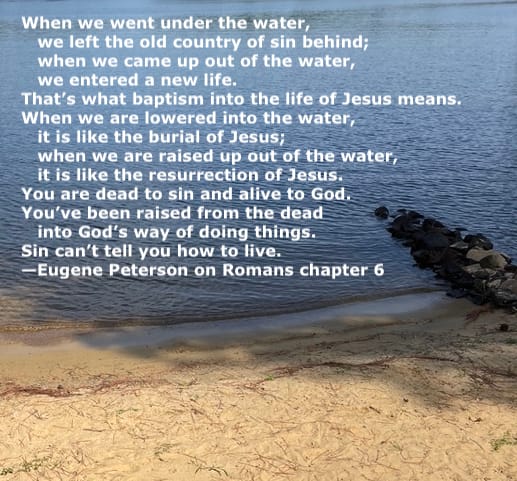Rebecca, Resurrection, and Seeing the Face of God — Luke 20.27–38

A sermon preached November 9, 2025.
Rebecca
Nancy and I will be at the funeral of Nancy’s 29 year-old niece Rebecca who died of heartbreak 6 weeks after a tractor trailer killed her husband riding his bicycle.
Gospel
Now, in today’s assigned Gospel reading, some rich people who are fundamentalist in their religious practice — which is who the Sadducees were — try to dumbfound Jesus about the illogic of the resurrection and eternal life. They open with a story about marriage from the apocryphal book of Tobit.
Sacrament
Marriage is the earliest sacramental rite:
“A man shall leave his father and his mother and hold fast to his wife, and they shall become one flesh.” —Genesis 2.24
The 2 primary sacraments of course are:
• Baptism
• and Holy Communion.
The 5 additional sacramental rites are:
• confirmation
• ordination
• marriage
• absolution
• and anointing of the sick.
The nature of sacraments is that they invite us into the wardrobe, into another realm, or more accurately: to reveal another level of reality. In order to fully access what the sacrament invites us into, requires a death and being born-again into a more mature stage of who God designed us to be.
Thus marriage, for example, requires that we die to our individual self in order to devote ourself to our spouse and become one flesh, even as Christ sacrifices himself in devotion to the Church.
Devotion
Love’s Inadequacy
At my annual covenant group reunion last month, one friend argued in favor of ‘marriage’ that may be non-monogamous and/or not till death. Another friend countered that the longer he’s been married, the greater his appreciation for the life-long commitment to monogamy. While they were talking I was praying to God for what to say.
I then shared that while I appreciate that many couples can grow over time in their appreciation for holy matrimony, time is not the critical factor.
Instead, I said that as I’ve studied the Bible more and more about this thing that we tend to translate as love, I've come to realize more and more that L-O-V-E is probably not the most adequate word to use in 2025. But rather I've come to land on the word devotion — as we still may comprehend it in current English — as what gets more to the heart of what is meant when the Bible uses words that we translate as love, because:
• Devotion requires some self sacrifice.
• Devotion requires stick-to-itiveness.
• Devotion requires a singleness — a unitary singleness — in the relationship, not a plurality in the relationship.
And so I said, “For some people, it may take 30 years of marriage till they get to a point of sanctification where they begin to get down to living out devotion. For someone else, they might be married for a month, and they already are hitting the nail on true devotion. And for other people, they don't need to be married at all in order for God to grow them in the virtues of a devoted love.”
Rebecca’s Devotion
And so even though Rebecca and her husband Mason had only 9 years together, I would shudder to say that they had any less devotion in their marriage than any of us here who may have decades of marriage under our belts. And I would shudder to say that their devotion was any greater than maybe those of us who are single and who have lived lives of selfless devotion to others. For: God is always going to find a way to refine us and mature us in his virtue of devoted love.
Distraction
The problem is we get distracted. Or as Allan puts it, we leak.
Jesus responds to the Sadducees:
“The sons of this age marry and are given in marriage” —Luke 20.34
—which echoes his earlier teaching on The Flood that:
“They were eating and drinking and marrying and being given in marriage, until the day when Noah entered the ark, and the flood came and destroyed them all.” —Luke 17.27
People were distracted by busyness-as-usual and didn’t realize how close to the precipice of Death they had come.
And when Jesus says that in life-after-death people
“neither marry nor are given in marriage, for they cannot die anymore, because they are equal to angels and are sons of God, being sons of the resurrection” —Luke 20.35–36
He shows us that the sacrament of marriage — as all of the sacraments — are no longer necessary on the other side of eternity. Likewise, the parental-child relationship is no longer necessary, for we will all be children of God.
Alive to God

Face of the Earth
Now, there’s a Hebrew phrase back in Genesis that talks about the “face of the land” or “face of the ground” or “face of the Earth”. It highlights human mortality, and gets repeated especially in The Flood narrative in Genesis chapters 6 to 8.
It is those living on the Earth who experience those no longer living on the face of the Earth as dead. It’s those of us who are living on this terrestrial sphere who experience those who have deceased as dead.
Alive
But to God they are alive. So Jesus says:
“But that the dead are raised, even Moses showed, in the passage about the bush, where he calls the Lord the God of Abraham and the God of Isaac and the God of Jacob. Now he is not God of the dead, but of the living, for all live to him.” —Luke 20.37–38
Jewish Martyrs
Jesus may be echoing here the legend of Jewish martyrs who had resisted a tyrant and were bravely willing to suffer torture and execution. It says, again in the Apocrypha, this time from 4 Maccabees:
“since they believe that they do not die to God, even as our patriarchs Abraam, Isaak and Iakob did not die to God, but live to God.” —4 Maccabees 7.19 (NETS)
They rejected complicity, stood up to a tyrant, and were willing and able to go to their deaths — all because they believed that the patriarchs were still alive to God. And so even if their lives would be snuffed out prematurely, they too would continue to go on being alive to God.
If we are alive to the Eternal One, then that means we are alive to eternity.
Alive to Eternity

Transcendent
Now, at the risk of waxing philosophically and speaking a bit densely, let me share this excerpt about continuing to live to God even after we expire:
“This is why we reverence their remains as what still speak to us even after the person is gone. Not even death can defeat the person who, somehow, is deathless. This is why the distinctive mark of all human societies is remembrance of the dead. We are inclined to think that thinking about the afterlife is the result of religion, but it is really the converse. Religion arises because we already know about the afterlife through our experience as persons who are never fully here and therefore are never fully departed.
To be a person is to be transcendent. We therefore know about the transcendent, God, only because we participate in that mode of being.” —David Walsh in The Priority of the Person (pub. Notre Dame 2020, pages 131–132)
How? Because: We are alive to God. And if we are alive to the Eternal One, then we are alive to eternity.
Persons Transformed via Face
Wrestle
Now, let's go back to Genesis: In Genesis chapter 32, the scene is: water, darkness, struggle, not-letting-go, and being named. This was the scene of Jacob’s being born again. He says:
“I have seen God face to face, and yet my life has been delivered.” —Genesis 32.30
God — who had every right to punish Jacob — gives him a new lease on life, and renames Jacob as Israel, “The one who has wrestled with God.” Jacob’s being born anew is a prophetic picture of nothing less than the resurrection.
Reparations
In the next chapter, Jacob pays reparations to his estranged brother Esau, and says:
“I have seen your face, which is like seeing the face of God, and you have accepted me.” —Genesis 33.10
Why is Esau’s face like God’s? Because Esau had righteous wrath against his brother who had wronged him 20 years earlier. And yet, like Yahweh, Esau spares Jacob. Esau gives Jacob a new lease on life.
Promise
A whole book later in Exodus chapter 33, Yahweh gives a prohibition to the sons of Israel:
“You cannot see my face, for man shall not see me and live.” —Exodus 33.20
We read this as a threat. But what if it is a promise?
“You cannot see me and live” — which is to say: “You cannot see me as you are and continue living the way you are. If you see me, I will require your life of you . . . so that: you may be born again!”
When penitent Jacob saw God’s face, he died to being Jacob and became Israel. Likewise in the New Testament, when im-penitent Saul encountered Jesus, he is reborn as Paul. When we encounter the face of God we will die to the old self and we become a new person — one way or the other.
In other words, transformation requires seeing another’s face — seeing the face of God, or seeing the face of God in the face of another person.
God Transformed via Face
Benjamin
At the end of Genesis when Jacob’s 10 sinful sons want to approach the intimidating Ruler of Egypt, and they don’t realize he’s actually their estranged brother Joseph, the text repeats 3 times the warning that the 10 sinful brothers cannot see the Prince of Egypt unless:
“You shall not see my face unless your brother is with you.” —Genesis 43.3, 43.5, 44.23
It is seeing innocent Benjamin that breaks Joseph’s heart, that enables him to embrace his brothers, and forgive them for the terrible wrongs they did to him.
But it's not about breaking only Joseph's heart. The text makes clear to us that having to separate their younger brother from their father Jacob who loved Benjamin so much, likewise broke the 10 brothers and brought them to a place of penitence — so that Joseph could be broken by Benjamin's presence as well and extend to them his magnanimous grace.
Before the Face of God for Us
And so we see in all of these stories: Jesus, the one who breaks God’s heart. Jesus precedes us in going before the face of God so that the Master of the Universe can receive us:
“For Christ entered . . . into heaven itself, now to appear before the face of God for us." —Hebrews 9.24 (ASV)
Why? For you.
Because Joe was transformed by seeing Ben’s face, he could receive his 10 sinful brothers. Because God is, as it were, transformed by seeing Jesus, He can see his face and ours.
Seeing God’s Face
Job
Job declares:
“I know that my Redeemer lives . . . in my flesh I shall see God, whom I shall see for myself, and my eyes shall behold” —Job 19.25–27
Psalm 17
Psalm 17 ends prophetically:
“As for me, I shall behold your face in righteousness; when I awake, I shall be satisfied with your likeness.” —Psalm 17.15
Revelation
In the resurrected life on the New Earth:
“his servants will worship him. They will see his face . . . And night will be no more. They will need no light of lamp or sun, for the Lord God will be their light” —Revelation 22.3–5
Aslan
C. S. Lewis captures a bit of all this in the goodness of Aslan’s face:
“the children were looking up into the Lion's face . . . And all at once (they never knew exactly how it happened) the face seemed to be a sea of tossing gold in which they were floating, and such a sweetness and power rolled about them and over them and entered them that they felt they had never really been happy or wise or good, or even alive and awake, before. And the memory of that moment stayed with them always . . . and [made] them sure, deep down inside, that all was well.” —The Magician's Nephew
Pray
Let us pray:
Lord, we want to see your face as if for the first time, more clearly than we ever have — so that we may die more than we ever have to ourselves, and be more alive to you than we ever have been. In Jesus’s name. Amen.




